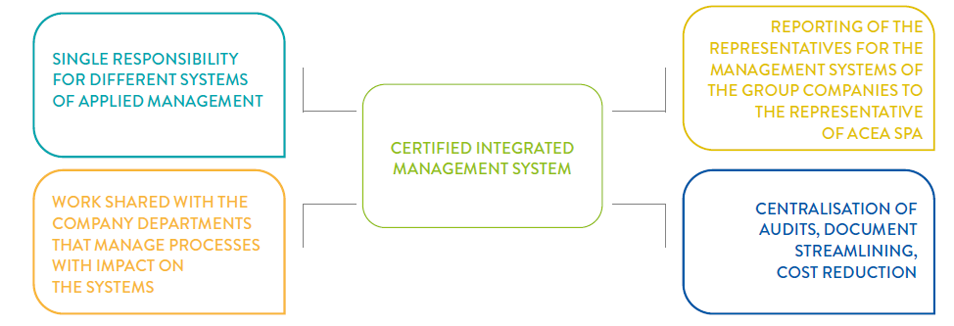Discover the Acea Group online 2019 Sustainability Report
Management Systems
A complex internal rule system supervises the organizational system, from the definition of the general directives to the statement of the particular business aspects, according to the following criteria:
- Group guidelines: principles, policies and management rules with which the Parent Company defines the general guidelines, guiding, coordinating and controlling the Group companies;
- Procedures: acts governing the way in which a process is implemented, identifying the roles and responsibilities in detail. The procedures also define the forms to be used and the records to be archived. Each corporate structure responsible for issues subject to internal regulation (Process Owner) draws up the procedure directly.
In order to ensure the overall consistency and compliance of the internal rules, before publication on the intranet they are subject to verification by specific units, such as Organization and planning, Compliance, etc.
The Integrated Certification Systems Unit within the Risk & Compliance Function defines the methods and standards of reference for the implementation of QASE certified management systems (Quality, Environment, Safety and Energy) as well as for further certifications and accreditations that the Acea Group intends to acquire, and operates in synergy with the Risk & Compliance Units of the Operating Companies, to which the certified Management Systems are ascribed. These Units collaborate with the Energy Manager for the development and management of the Energy Management System and with the Head of the Prevention and Protection Service (RSPP) and the emergency coordinator for the Workplace Health and Safety Management System. The management of health, safety and environmental emergencies is handled by means of a specific procedure.
Acea also relies on professional profiles such as the Energy Manager – in the Parent company and in the Companies – and the Mobility Manager, whose duty is to respond to the demands for optimum management of internal energy consumption and staff mobility. They seek systemic efficiencies and savings in important aspects related to the running of an organization, such as use of energy and employees’ transfers, which also create positive external effects in terms of lower use of resources and reduction in greenhouse gas emissions and optimisation of travelling times and routes for employees, respectively, while increasing road safety and reducing urban traffic. The Energy manager, in particular, has the duty of implementing actions regarding energy efficiency, reduction of consumption and cost control, in order to ensure the progressive optimisation of the Group’s energy costs, activating coordination with Energy managers in the Companies.
CHART NO. 14 – THE CERTIFIED INTEGRATED MANAGEMENT SYSTEM

The management of quality, the environment, safety and energy is a central aspect in corporate operations, as can be deduced from the number of Group companies which have implemented certified integrated management systems over time. In 2019 12 of the Group companies had certified management Systems (see table no. 12) and the Acea Ambiente plants located in Terni, San Vittore del Lazio and Orvieto were EMAS registered.
New developments during the year include:
- ISO 9001 certification for Acea Energia and the implementation of stage 1 for obtaining ISO 14001 certification;
- ISO 9001 certification in the EA28 sector (construction and installation) for Acea Elabori;
- Ecogena’s implementation of stage 1 for obtaining ISO 50001 certification.
Considering all the Companies in the scope:
- more than 80% have a quality certification;
- 77% have an environmental certification (100% in the Water and Environment business areas);
- more than 90% have a safety certification (100% in the Water, Environment and Infrastructure business segments);
- about 40% have a certified energy management system (this percentage includes the most energy-intensive companies, with consumption of at least 10,000 TOE).

TABLE NO. 12 – CERTIFIED MANAGEMENT SYSTEMS IN THE ACEA GROUP (AS AT 31.12.2019)
| QUALITY (ISO 9001) | ENVIRONMENT (ISO 14001) | SAFETY (OHSAS 18001/ISO 45001) | ENERGY (ISO 50001) | OTHER | |
| Acea SpA | X | X | X (ISO 45001) | X | |
| WATER AND ENGINEERING SEGMENT | |||||
| Acea Ato 2 | X | X | X | X | |
| Acea Ato 5 | X | X | X (ISO 45001) | X | |
| Gesesa | X | X | X | ||
| Gori (*) | X | X | X | ||
| Acea Elabori | X | X | X (ISO 45001) | UNI CEI EN ISO/IEC 17025:2005 Accreditation of lab analyses UNI CEI EN ISO/IEC 17020:2012 Accreditation of inspection bodies | |
| ENERGY INFRASTRUCTURE SEGMENT | |||||
| Areti | X | X | X | X | |
| Acea Produzione | X | X (ISO 45001) | |||
| Ecogena | X | X (ISO 45001) | UNI CEI 11352 | ||
| COMMERCIAL AND TRADING SEGMENT | |||||
| Acea Energia | X | X | |||
| Acea8cento | |||||
| ENVIRONMENT SEGMENT | |||||
| Acea Ambiente | X | X | X | X | EMAS |
| Aquaser | X | X | X | ISO 39001:2012 |
(*) Quality and Environment certifications specifically cover engineering, design and project management activities; analysis (chemical-physical-biological and microbiological); control of industrial waste discharges.
Each company with certified Management systems carries out an annual managent review with the aim of assessing the effectiveness of quality, environment, safety and energy management systems, proposing possible improvements and verifying the progress of activities. On these occasions, which are attended by the Top Management and the first line of managers of the Companies in question, elements are analysed, including: policy; context analysis and materiality analysis at a Group level; risk assessment; process performance; significant environmental and energy aspects; changes in legal requirements and those relating to workplace health and safety, environment and energy; supplier performance; customer satisfaction levels; analysis of complaints; accidents and injuries; objectives.
The results of the review for 2019, finding no criticalities, confirmed the adequacy and efficiency of the management Systems.
Finally, it should be noted that Acea – continuing the process of integration initialized and formalized the Sustainability Policy and the environmental, safety and energy quality system – continued to manage the objectives required by the Management system in an integrated manner with the objectives of the 2019-2022 Sustainability Plan approved by the Board of Directors.
